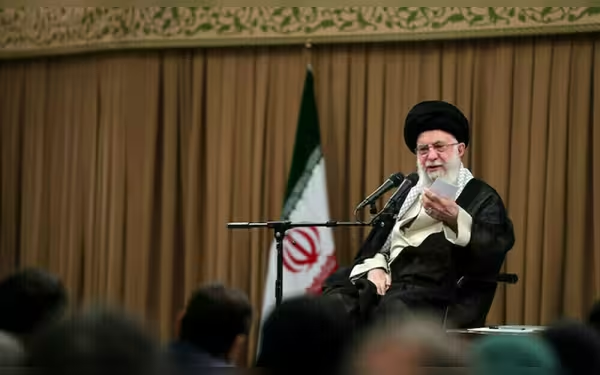Sunday, October 6, 2024 12:31 AM
Khamenei Asserts Iran’s Allies Will Stand Firm Against Israel
- Khamenei vows allies will not retreat in conflict.
- Israeli strikes have caused significant casualties in Lebanon.
- International community concerned about regional stability.
 Image Credits: brecorder
Image Credits: brecorderKhamenei declares Iran's allies will not back down in the ongoing conflict with Israel amid escalating tensions and humanitarian crises.
In a significant address delivered on Friday, Iran’s Supreme Leader, Ayatollah Ali Khamenei, made a bold declaration regarding the ongoing conflict with Israel. This statement comes in the wake of escalating tensions in the region, particularly following Iran's recent missile strike against Israel, which Khamenei defended as a necessary action. The backdrop of this conflict is marked by a year of violence that began after the Hamas attacks on October 7, leading to a series of retaliatory actions and military engagements involving Hezbollah and Israeli forces.
During his speech in Tehran, Khamenei emphasized that Iran’s allies in the region would not retreat in the face of adversity, stating, "The resistance in the region will not back down with these martyrdoms, and will win." This assertion reflects Iran's commitment to supporting groups like Hezbollah, which has been engaged in fierce battles against Israeli troops in Lebanon. The situation has become increasingly dire, with reports indicating that over 1,000 individuals have lost their lives due to Israeli strikes on Hezbollah positions since late September.
As the conflict intensifies, Israel has shifted its focus towards securing its northern border with Lebanon, aiming to facilitate the return of approximately 60,000 displaced Israelis. However, the humanitarian crisis in Lebanon is worsening, with hundreds of thousands fleeing their homes amid ongoing violence. The Lebanese health ministry has reported significant casualties, and the fear among civilians is palpable, as expressed by a displaced nurse in Beirut who voiced concerns for her children, stating, "This war is going to be long."
In response to the missile attacks from Iran, Israeli Defence Minister Yoav Gallant warned that those who attack Israel would "pay a heavy price." This statement underscores the escalating cycle of retaliation that has characterized the conflict. Iran, on the other hand, has vowed to increase its military response if Israel continues its counterattacks, further heightening tensions in the region.
The situation is further complicated by the involvement of international players. U.S. President Joe Biden has expressed hope that an all-out war can be avoided, but he acknowledged that much work remains to be done to stabilize the region. Meanwhile, the humanitarian situation continues to deteriorate, with reports indicating that an Israeli strike has cut off a crucial road to Syria, leaving many trapped in Lebanon.
As the conflict rages on, the implications for the broader Middle East are profound. The violence not only affects those directly involved but also has the potential to draw in neighboring countries, creating a larger regional crisis. The ongoing hostilities have already resulted in significant loss of life, with the toll in Gaza reaching alarming numbers, as reported by health officials in the territory.
The situation in the Middle East remains precarious, with the potential for further escalation looming large. As leaders on both sides make statements that could inflame tensions, the hope for a peaceful resolution seems distant. The international community watches closely, aware that the consequences of this conflict extend far beyond the borders of Israel and Lebanon, impacting the stability of the entire region.













